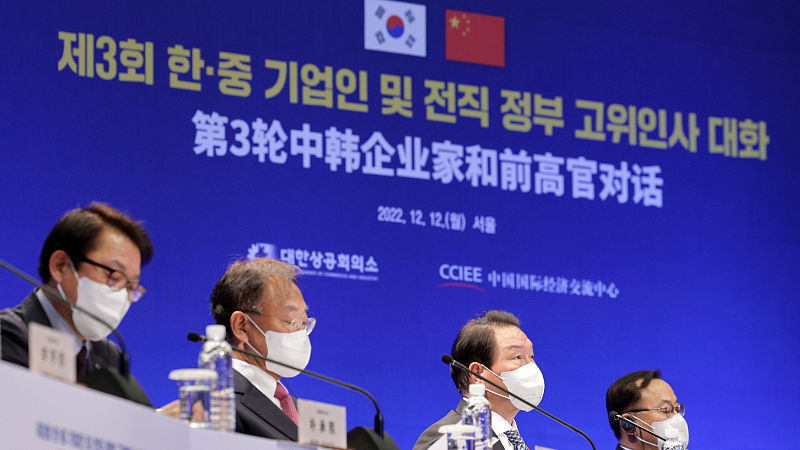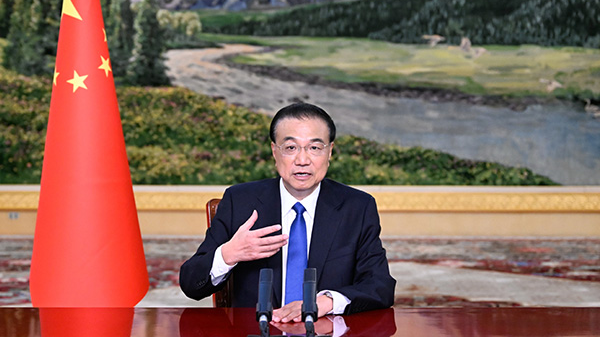
The third China-ROK Entrepreneurs and Former High-Level Official Dialogues is held online, Seoul, South Korea, December 12. /CFP
The third China-ROK Entrepreneurs and Former High-Level Official Dialogues is held online, Seoul, South Korea, December 12. /CFP
Editor's note: Hamzah Rifaat Hussain, a former visiting fellow at the Stimson Center in Washington and former assistant researcher at the Islamabad Policy Research Institute, is a TV anchor at Indus News in Pakistan. The article reflects the author's opinions and not necessarily those of CGTN.
While addressing the third China-ROK Entrepreneurs and Former High-Level Official Dialogues via video, on December 12, Chinese Premier Li Keqiang called on both China and South Korea to work towards maintaining the smooth flow of industrial supply chains and safeguarding the international free trade system. Besides, Chinese Foreign Minister Wang Yi in his exchange with his counterpart Park Jin also spoke about how both countries should play a constructive role to diffuse nuclear tensions on the Korean peninsula. Meaningful cooperation between the two countries, stronger trading ties for joint prosperity and resolution of security quagmires for a more promising future can materialize.
Friendship, cordiality and leveraging complementary strengths is the key to address common challenges faced by the two countries. With this year marking the 30th anniversary of diplomatic relations, China and South Korea can take their existing platforms to new levels. This includes the completion of the second phase of the China-South Korea Free Trade Agreement (CSKFTA) of 2014 which covers 17 areas of goods trade, government procurements, preservation of the environment, competition policies and e-commerce. Both sides made a commitment after the signing of the agreement that they will continue to carry out service trade negotiations as follow ups. CSKFTA also allows for 91 percent of South Korea exports to China being subject to tariff elimination in 20 years which amounts to $141.7 billion. Secondly in terms of market openness, both sides will provide reciprocal treatment to each other's financial companies entering their own capital markets. A prime example is how Korean construction companies in the Shanghai Pilot Free Trade Zone can contract cooperative projects in China in the absence of restrictions concerning proportional investments.
The completion of the second phase of CSKFTA can complement the positive trading trends between the two countries. In the first seven months of 2022, bilateral trade had risen to 8.9 percent and amounted to $214.9 billion, accounting for 5.9 percent of China's total foreign trade. As per a Korean Peninsula expert from the Liaoning Academy of Social Sciences Lu Chao, such figures indicate growth momentum in the existing complementarity between the two countries involving supply and production chains, especially in high technology and chemical industry. Leveraging complementarity for win-win cooperation is precisely what Premier Li alluded to at the third ROK Entrepreneurs and Former High-level Officials Dialogue where there's deepening cooperation in the fields of high-tech manufacturing, big data and the green economy. Friendly, neighborly relations provide a context through which the rights of foreign investors, encouragement of fair competition between all enterprises and fostering market-based environments can materialize.

Chinese Premier Li Keqiang addresses the third China-ROK Entrepreneurs and Former High-level Officials Dialogue via video link, Beijing, China, December 12, 2022. /Xinhua
Chinese Premier Li Keqiang addresses the third China-ROK Entrepreneurs and Former High-level Officials Dialogue via video link, Beijing, China, December 12, 2022. /Xinhua
To capitalize on these positive trends, it is critical that threats to the global multilateral trading order have to be addressed. During talks with South Korean Foreign Minister Park Jin, Foreign Minister Wang Yi mentioned how measures adopted by the U.S. President Joe Biden's administration such as the CHIPS and Science Act of 2022 and the U.S. rejection of the WTO's decision regarding former U.S. president Donald Trump era steel tariffs violated international rules and regulations. Such unilateral approaches only harm impartial trading between countries in the Asia Pacific and beyond, which promote joint prosperity.
To safeguard the international free trade system and ensure the smooth progression of supply chains, it is crucial that sustainable peace and long-term stability in the Korean peninsula materializes. Given their geographical proximity and historical influence, both China and South Korea are in an excellent position to resolve instability through dialogue and diplomacy. Foreign Minister Park Jin sought China's support for Seoul's initiative on providing economic assistance to Democratic People's Republic of Korea in exchange for denuclearization steps and initiating dialogue between the two countries. Such solution-oriented proposals need to be articulated between respective leaderships on both sides to ensure that zero-sum approaches are replaced with win-win cooperation.
For far too long security dynamics in the Asia Pacific have been defined by Cold War binaries perpetuated by the United States that include attempts to bifurcate the region into "pro-China" and "anti-China" camps. Such strategies alongside military build ups aimed at promoting separatism in China's Taiwan region threaten to upend the status quo and have led to greater misunderstandings between regional countries. The respective leaderships of both China and South Korea should ensure that trust deficits do not widen and joint understandings prevail on matters relating to peace, security and stability in the Asia Pacific.
The messages articulated during delegation level talks between China and South Korea including Premier Li Keqiang's calls at the third China-ROK Entrepreneurs and Former High-Level Officials Dialogue provides a road map for both countries to take their strategic cooperation to new heights and build on the spirit of the 30th anniversary of diplomatic ties.
(If you want to contribute and have specific expertise, please contact us at opinions@cgtn.com. Follow @thouse_opinionson Twitter to discover the latest commentaries on CGTN Opinion Section.)